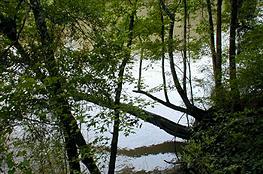Recently a team of scientists from the Skidaway Institute of Oceanography and the University of Georgia's Department of Marine Science completed a study showing some very alarming statistics about the loss of wetlands in the Altamaha Watershed. The study revealed that between l989 and l996, the Altamaha River watershed lost approximately 48% of its wetlands below the fall line. Wetlands -- Why are they important to us as a society? All life revolves around water. Without water no creature could exist including human beings. How are we losing our wetland treasures? We are losing most of these wetlands through human impacts including development and poor agricultural and forestry practices. Many people wonder why, (aside from their concern about the wild creatures that inhabit wetlands), and how the loss of wetlands impacts them? You can make a simple experiment for yourself that illustrates the function of wetlands. Take an eight-ounce measuring cup and fill it half way with sand or dirt. Then take eight ounces of water and pour it into the cup with the sand. Observe how much water you have left that would not fit into the half filled cup. Now consider a wetland that has been filled and developed. When the rains come, what happens to the water? It is easy to visualize the water that the wetland once held now has no place to go except into the surrounding area. If the area has been developed, it is no longer available to absorb that water. Instead it has become an undesirable place for the absorption of floodwater like your yard or possibly even your living room. Agricultural destruction of wetlands also has possible negative side effects for humans. Let's assume that a landowner has a large field that includes an isolated wetland that is used for planting crops. The landowner decides they need these wetland areas to increase their cultivated acreage. Normally the wetland's trees, vines, and grasses would assimilate the run off from rains that carry fertilizers and other nutrients into these wetland areas. Without these natural vegetative areas still intact, these nutrient and possibly chemical laden run off waters could remain in the low-lying area for days or even weeks. This could result in these same nutrients and chemicals leaching down into drinking water supplies. If this happens wells and aquifers can become contaminated for miles around. Forestry practices that are not compatible with good land stewardship can also be devastating to wetland areas. Poor forestry practices such as the ditching and draining of wetlands are extremely devastating practices. These activities can cause rapid run off from rains that cause the creeks and rivers to rise and fall at excelerated rates causing such things as disruption in fish spawning and feeding practices. Often times slow moving bottom dwellers such as mussels can get trapped into situations where the water falls at such a rapid rate they get left high and dry. This would likely cause high mortality rates in this species. In some circles wetlands are thought of as natures kidneys because they perform a function in nature similar to that which our kidneys do for our body. As waters flow through wetlands, many of the undesirable elements are filtered out and used up by the natural vegetation there by improving water quality. When this very important function is not available, these undesirable elements enter our streams and this increases the opportunity for undesirable algae blooms that can cause low dissolved oxygen in the water that can lead to fish kills. Swamps and wetlands also serve as the home to many of natures' creatures. A tremendous variety of animals use wetland habitat including many species of wading birds, ducks, fur bearing animals, snakes and, of course, the crustaceans and fresh water mussels. Each wetland is a small ecosystem within itself capable of sustaining life so long as they are left intact and undisturbed. Our wetlands are as import to the ecology of our state as rain forests are to other parts of the world. Wetlands are habitats that sustain life, aid in protecting water quality and in many cases, if left intact, help to prevent flooding by holding water that would end up flooding our towns and neighborhoods. If you live in an area that once only flooded occasionally yet seems to flood more frequently now, take a look around and see if that swamp that used to be just down the road is still there. If you don't have the ducks and other wildlife around that you once had, look around and see if your wetlands are still there. If you value nature and God's natural gifts as I do, then you will surely understand why wetlands are a true and valuable treasure. These natural treasures do not have to be created; all we have to do is protect them. |
